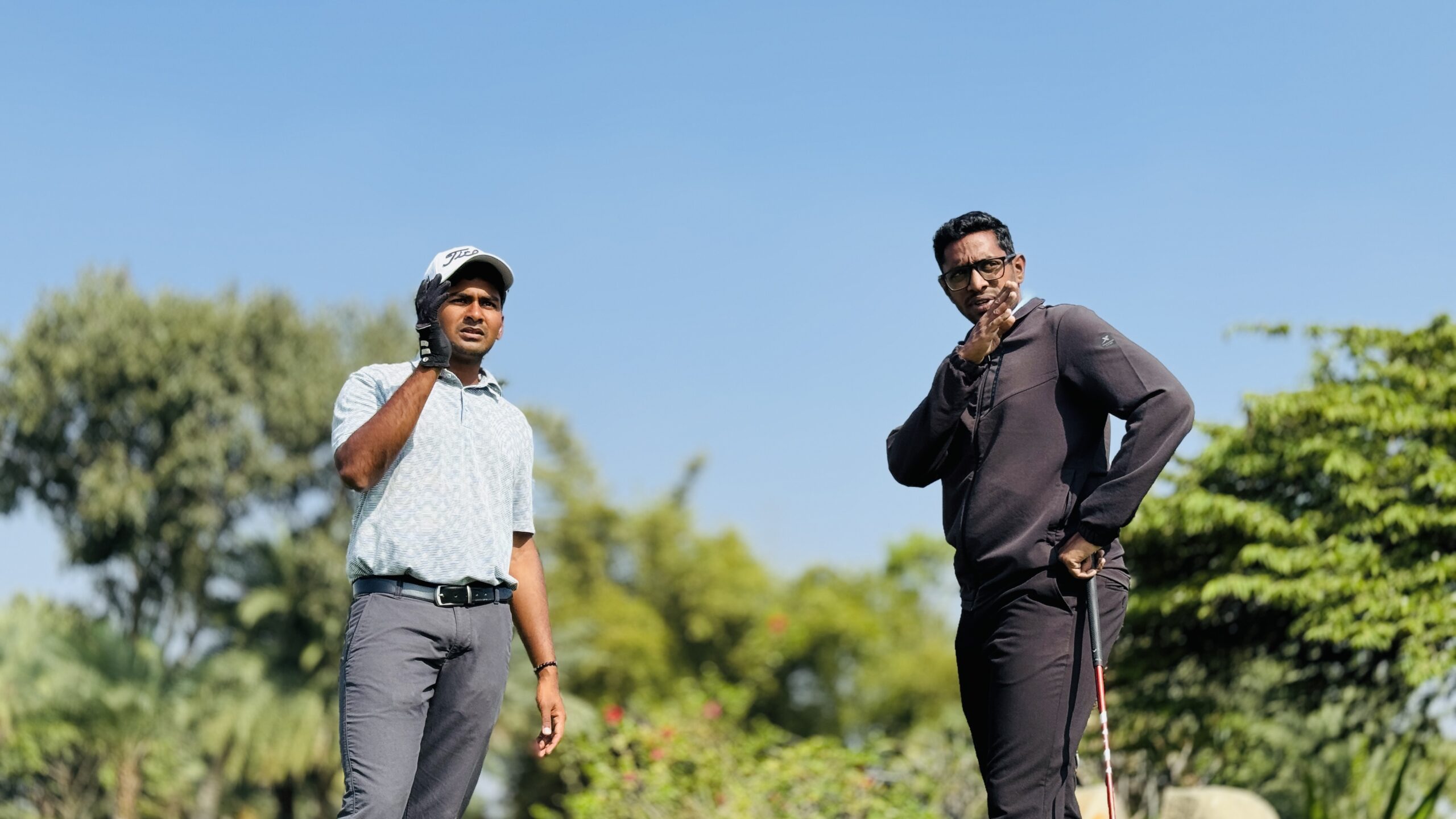Whether you’re a student, an athlete, or someone just figuring things out, some highs lift you and lows knock you down. The truth is, the biggest test of progress isn’t found in how we celebrate wins, but in how we respond when things don’t go our way.
In sports, physical skills frequently receive the most attention. To develop their technical skills, athletes put in endless hours in the gym, on the field, or the course. But time and again, the mindset, rather than the swing, stroke, or serve, determines the result. Professional athletes already know how to handle pressure. They’ve built that internal radius to recognize what’s happening inside them – whether it’s emotions, focus, or commitment. But for most up-and-coming athletes, self-awareness is still an untapped skill. And without it, frustration and self-doubt often snowball into bigger problems on the course or field.
When Pranav Jose, our resident Sports Psychologist kicked off this player meeting, he made one thing clear: self-awareness isn’t just another buzzword – it’s the missing link for many athletes, especially the juniors and amateurs.
What is self-awareness in sports?
Fundamentally, self-awareness is the ability to identify your feelings, thoughts, and behaviors, particularly while under stress. This is more than simply a “nice-to-have” ability for athletes. Performance is directly impacted when you are self-aware. Here are a few aspects that affect your performance-
- Emotions: If unmanaged, frustration, worry, doubt, or overexcitement can impair your judgment in the game.
- Behaviors: Emotional triggers can cause reactions such as rushing through routines, walking more quickly when nervous, or even cursing after a poor shot.
- Thought Patterns: Before the next move is even made, performance is frequently ruined by negative self-talk (“That was terrible!”) or an excessive attention to possible errors.
Adapting to strike this balance is difficult and can be mastered only by focusing on the positive. However, because players are less aware of these internal signs, especially the amateurs and juniors, they frequently suffer.
Self-Awareness: Internal versus External
There are two main components to self-awareness:
INTERNAL AWARENESS: Understanding your values, emotional triggers, and areas of strength and weakness is known as internal self-awareness. For instance, consciously slowing down your routine after realizing that you make snap decisions when under pressure.
EXTERNAL AWARENESS: Knowing how your activities affect other people, such as coaches, opponents, and teammates, is known as external self-awareness. Example: In match play, recognizing that an opponent just hit a weak shot and altering your strategy accordingly.
Both these types of awareness are essential for a sportsperson. External awareness guarantees more intelligent strategic decisions and improved team relations, while internal awareness aids athletes in self-management.
Why self-awareness matters: The Four Pillars
- Regulation of emotions: Anger, anxiety, and doubt are all natural emotions. Athletes’ reactions are what count. In the absence of awareness, a single bad shot might turn into several bogeys. A self-aware athlete knows well when to stop, acknowledge the feeling, and start over.
- Maximizing your advantages and disadvantages: Knowing your strengths and areas for improvement enables more intelligent training of a player. It involves more than just physical performance; it also involves mental clarity.
- Keeping mental toughness and focus: Athletes who possess self-awareness can identify when their attention pans towards the pessimistic ideas and redirect it back to strategy and execution.
- Better decision-making: By being aware of their mental processes, athletes usually become crystal clear about snap decisions. Rather than hurrying, they can verify distances, lies, and procedures, and then act accordingly.
Letting Go: a Psychological Analysis
When you are on the course, playing your game, it’s the practice, focus, and determination that puts a player together. But despite all these strong aspects of a good game, mistakes are bound to happen and can happen to anyone. Now, the question is – What is the speed at which you can recuperate?
Pranav highlighted that the brilliant players don’t dwell on mistakes; instead, they make a fresh start and leave. To talk about golf specifically, some players frequently carry the baggage of their bad performance to the next play. And this, in turn, is of no help, instead it leads to further errors.
Ways to release stress more quickly
- Change from Emotion to Logic: Rephrase “That was awful” to “I’ll give it my all next time.” This kind of mentality shall prevent an emotional reaction and maintain it analytically.
- Reframe Errors as Teaching Opportunities: Say “That shot lacked commitment” instead of “I’m bad at bunker shots.” The process will be trusted the next time.
- Instead of attempting to eliminate mistakes, focus on improving your response when they do occur.
Types of Athletes and what causes them
Under stress, various mental profiles react in different ways:
- Thinkers: After blunders, tend to overanalyze the event.
Solution: If you are a thinker, what’s best advised is to remain reasonable but refrain from overanalyzing.
- Feelers: They frequently, harshly, criticize themselves.
Solution: Such players, to lessen emotional spirals, must engage in neutral self-talk.
- Sensors: These are the ones who may let things get too complicated.
Solution: These players are advised to keep calm while concentrating on technical details.
And here is a question for self-analysis- What kind of a player you are?Understanding your type helps you develop specialized coping mechanisms and raises your level of self-awareness.
There have been instances where some of the finest players have time and again proved why they stand out from the crowd. Along with understanding and attaining the required game knowledge and physical strength towards their sport, a great amount of emphasis on what kind a player they are, their understanding about self-awareness have helped them keep their calm and play better sport. Pranav quoted some examples which included-
- Tiger Woods (Masters 2019): Known for picking himself up right away after poor strokes, Tiger is a good example of the capacity to move on and remain focused on the next chance.
- Roger Federer: Federer won slightly more than half of the points he played in his thousands of matches. His power? He never allowed one point’s loss to impact the next.
- Serena Williams: Extremely sentimental on the court, yet her strength is in her ability to recover quickly from errors. She can soon reset and identify emotions thanks to her self-awareness.
Letting Go + Self-Awareness to develop mental toughness
What exactly does mental toughness entail, then?
It has nothing to do with repressing feelings or aiming for excellence. It concerns:
- Being able to identify your emotional triggers instantly.
- Avoiding emotional responses in favor of rational and helpful ones.
- Letting go of errors fast to maintain focus on the things that can be controlled.
Training the mind like the body
The mental aspect of sports is frequently neglected and viewed as “on-demand” or optional. In actuality, you will never realize your full potential if you do not train your mind. At TSG, we are dedicated towards preparing you for every aspect of the game, be it the physical skills, the nutritional values, body relaxation or the mental spirit. Self-awareness and the capacity to let go are abilities that are an integral part of the learning at TSG. Your mind requires repetition, practice, and deliberate effort, just like your body and we are hard-wired to provide an environment where you can work over it.
But the least you can do for your part is to make a commitment to monitoring your feelings, ideas, and actions during practice and competition as soon as possible. You must also recognize your triggers, work on rephrasing your errors, and concentrate on reacting rather than responding.
Because great athletes don’t strive for perfection, their goal is to achieve the best possible outcome!



